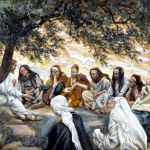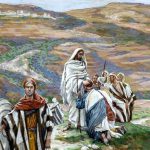
Paul Writing His Epistles (c. 1619), by Valentin de Boulogne
“For I could wish that I myself were cursed and cut off from Messiah for the sake of my people, those of my own race, the people of Israel.” (Romans 9:3)
We know him as Paul, the Apostle to the Gentiles.
But not many Gentiles or Jews realize just how Jewish Paul remained after being called by God to take the Good News to the Gentiles.
Even when the Jewish People tried to ambush him and kill him, he stayed loyal to his brethren and the teachings of God’s Instructions (the Torah), Jewish prophets (Nevi’im), and the Jewish writings (Ketuvim).
As we’ll see from his own words, Sha’ul (Paul) traveled the Roman Empire teaching both Jews and Gentiles about the salvation of Messiah Yeshua (Jesus) by speaking from the depths of his heart, soul, and mind as a Jewish Rabbi.
And there is much in his life that we, too, can emulate as we reach out to Jewish people and Gentiles alike, in the hopes that some will be saved.
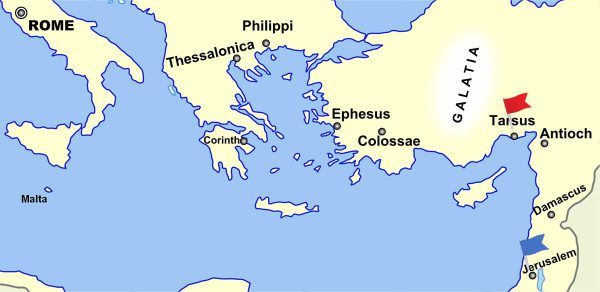
Map showing Jerusalem (blue flag) and Paul’s birthplace Tarsus (in modern—day south central Turkey — red flag) as well as the major cities where Paul spread the Gospel and planted churches.
“I am a Jew, from Tarsus in Cilicia, a citizen of no ordinary city.” (Acts 21:39)
Paul was born Sha’ul, a Hebrew name that means asked for or prayed for.
He had the good fortune of being born in the capital of the Roman province of Cilicia — Tarsus, which was a “free city.” This gave Paul Roman citizenship at birth (Acts 22:28).
Citizenship helped Paul to avoid some terrible scourging and flogging, which was illegal to inflict on a Roman citizen without a fair trial.
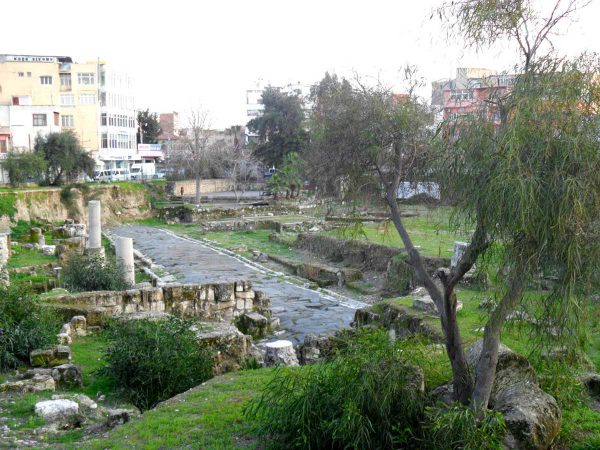
Turkey, ancient Roman road in Tarsus. (Photo by Nedim Ardoğa)
Tarsus was highly regarded for its universities, which rivalled that of Athens or Alexandria, producing great poets, linguists, and philosophers, the likes of which Paul would refer to as he reasoned with the people in the Greco-Roman empire.
Though the city of Tarsus had so much to offer, Sha’ul (Paul) was raised in Jerusalem from his youth and became a student of the great Rabbi Gamliel, one of the most respected Jewish scholars of the day and still famous to this day.
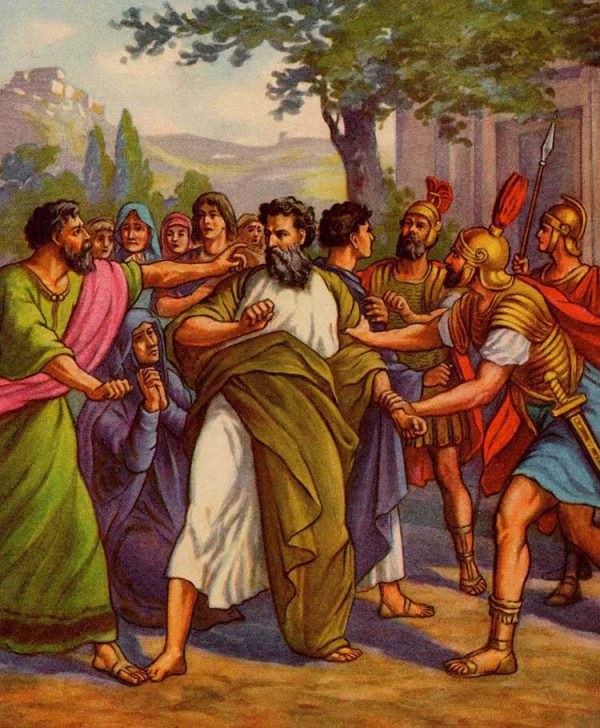
Paul Is Arrested (Bible Card)
As a follower of Yeshua, Paul tries to explain just how Jewish he is to a crowd of Jewish People at the Temple in Jerusalem who want to kill him for his faith in Yeshua.
While they were beating him, the Roman commander arrests him and begins to carry him away, but Paul asks to speak to his Jewish brethren in the hopes that he might save some of them.
This is where we will begin our understanding of Paul as a Rabbi, in his own words.
“I studied under Gamliel and was thoroughly trained in the [Torah] law of our ancestors. (Acts 22:3)
Hearing Paul speak in their common dialect, the crowd becomes silent. They are likely impressed at Paul’s education, since Gamliel the Elder was a highly revered teacher (Rabbi) of the Torah.
Gamliel’s grandfather, the great Jewish sage and scholar Hillel the Elder, led the Pharisee sect, which began the practices and teachings that developed into today’s Rabbinic Judaism.
While under Gamliel’s teaching, Paul became especially zealous regarding the laws against idol worship and blasphemy, which required the death sentence according to Jewish law.
“I was just as zealous for God as any of you are today,” he said. (Acts 22:3)
He also confesses to the Jewish people, who are still listening earnestly:
“I persecuted ‘The Way’ [the name title give to the movement of Jewish followers of Yeshua] to the death, binding and putting both men and women into prisons, as also the high priest and all the Council of the elders can testify.” (Acts 22:4-5)
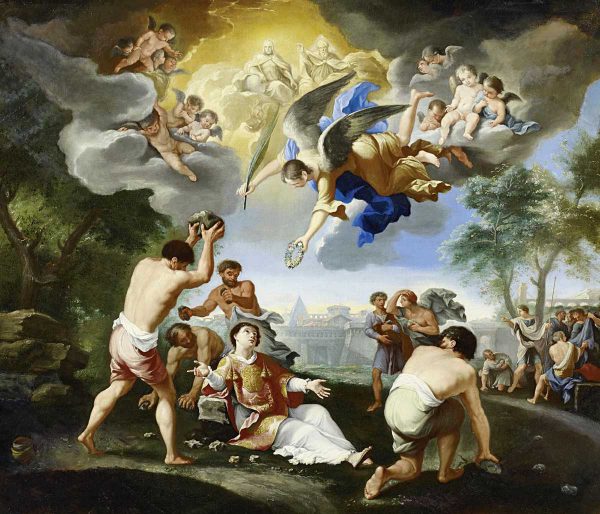
Stephen, a disciple of Yeshua, gets stoned for his faith as Paul looks on, guarding the clothes of those stoning him in Acts 7:58, 22:20. (Illustration: The Stoning of Stephen, by Luigi Garzi (1638–1721)
Paul’s personal and religious mission at one time was to put some of the first followers of Yeshua to death!
However, his hatred of Yeshua (Jesus) and His followers stopped at a single moment when God supernaturally came into Paul’s life. He experienced his sight disappearing and Yeshua (God) speaking directly to him. Then he had a vision, his sight returns after three days and is filled with Ruach Hakodesh (the Holy Spirit).
Here is the full story in Acts 9:1–17:
Sha’ul was still breathing out murderous threats against the Lord’s disciples. He went to the Jewish High Priest and asked him for letters to the rabbis of the synagogues in Damascus, Syria so that if he found any there who belonged to the Way, whether men or women, he might take them as prisoners to Jerusalem.
As he neared Damascus on his journey, suddenly a light from heaven flashed around him. He fell to the ground and heard a voice say to him,
“Sha’ul, Sha’ul, why do you persecute me?”
“Who are you, Lord?” Sha’ul asked.
“I am Yeshua, whom you are persecuting,” he replied. “Now get up and go into the city, and you will be told what you must do.”
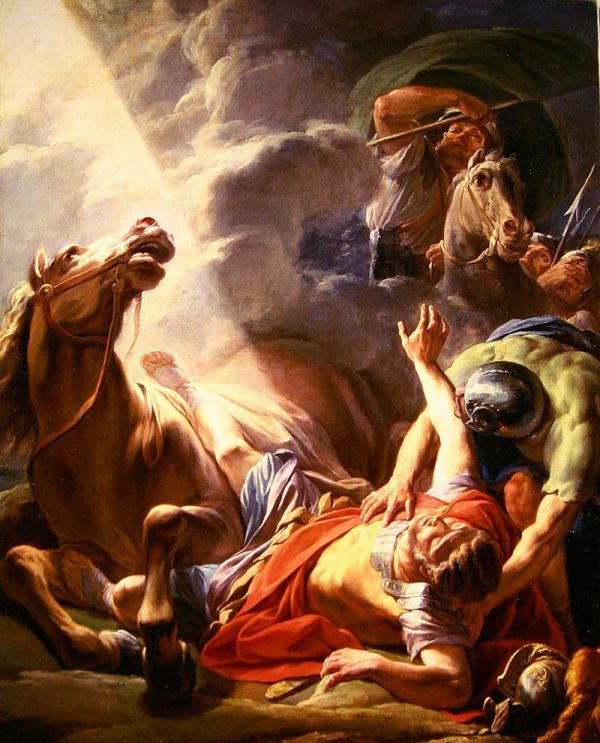
The “Conversion” of Paul (1765), by Nicolas Bernard Lépicié, depicts Sha’ul being thrown off his horse as he encounters the Shekhinah Glory of Yeshua/God (Acts 22:6–21).
The men traveling with Sha’ul stood there speechless; they heard the sound but did not see anyone. Sha’ul got up from the ground, but when he opened his eyes he could see nothing. So they led him by the hand into Damascus. For three days he was blind, and did not eat or drink anything.
In Damascus there was a disciple named Ananias. The Lord called to him in a vision, “Ananias!”
“Yes, Lord,” he answered.
The Lord told him, “Go to the house of Judas on Straight Street and ask for a man from Tarsus named Sha’ul, for he is praying. In a vision he (Paul) has seen a man named Ananias come and place his hands on him to restore his sight.”
“Lord,” Ananias answered, “I have heard many reports about this man and all the harm he has done to your holy people in Jerusalem. And he has come here with authority from the chief priests to arrest all who call on your name.”
But the Lord said to Ananias, “Go! This man is my chosen instrument to proclaim my name to the Gentiles and their kings and to the people of Israel. I will show him how much he must suffer for my name.”
Ananias then went to the house and placed his hands on Sha’ul .
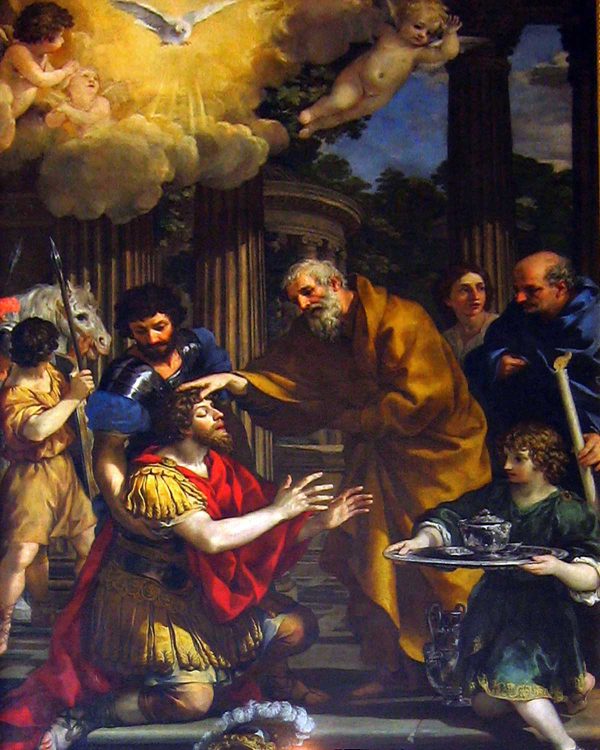
Ananias Restoring the Sight of St. Paul (1660), by Ciro Ferri
Paul could see again and was filled with the Holy Spirit. He then spent several days with the Jewish followers of Yeshua in Damascus and Immediately started to preach in the synagogues about Yeshua being the son of God. Soon after the Jews began to plot how to kill him.
He left for Jerusalem where the disciples and apostles at first did not accept him because of his recent past as an enemy of the faith. He left Israel and began to spread the Good News to the Nations (Gentiles).
Most Pastors will say that Paul converted to a new religion called Christianity on that day when he was blinded by God’s light. But what he actually converted to was a heart and mind filled with the Spirit of God. He often wrote of God’s love that now filled him:
“Be devoted to one another in love. Honor one another above yourselves. Never be lacking in zeal, but keep your spiritual fervor, serving the Lord. … Bless those who persecute you; bless and do not curse.” (Romans 12:10–14)
Paul showed this love even to those who were persecuting him. For example, when God opened the prison doors for him to escape he was more concerned about the guard’s salvation than his own freedom.
“About midnight Paul and Silas were praying and singing hymns to God, and the other prisoners were listening to them. Suddenly there was such a violent earthquake that the foundations of the prison were shaken. At once all the prison doors flew open, and everyone’s chains came loose. The jailer woke up, and when he saw the prison doors open, he drew his sword and was about to kill himself because he thought the prisoners had escaped. But Paul shouted, “Don’t harm yourself! We are all here!” (Acts 16:25–28)
Some say Paul became somewhat of a Gentile after meeting Yeshua, such as taking on the Greek name Paulos (Paul).
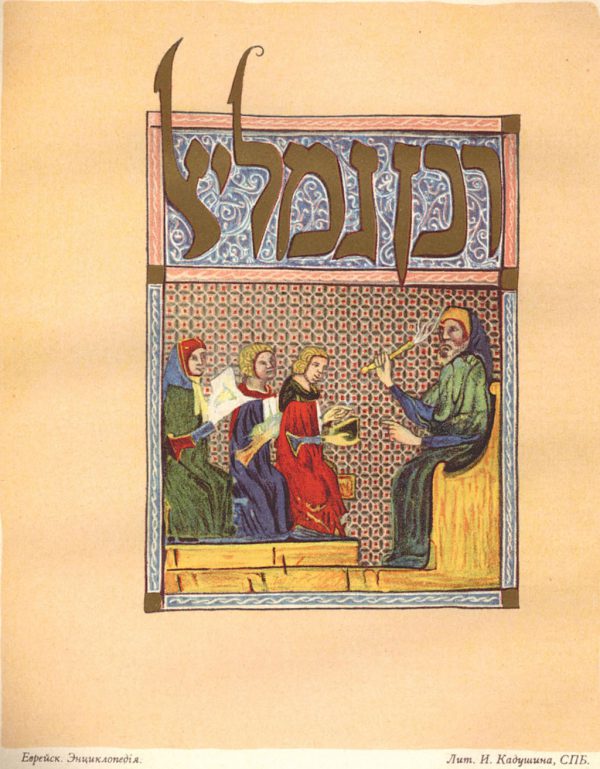
Image of Gamliel and students. The Hebrew caption רבן גמליﭏ reads “Rabban Gamliel” (Brockhaus and Efron Jewish Encyclopedia, 1906–1913)
But it was not God who asked him to use this name; in fact, when the Holy Spirit commissioned him into service, He called Paul by his Hebrew name:
“Set apart for me Barnabas and Sha’ul for the work to which I have called them.’” (Acts 13:2)
Paul preferred to use his Greek name Paulos or even his Roman/Latin name Paulus to make it easier for Gentiles to relate to him as he traveled throughout their lands.
Let us go back now to Paul speaking to the Jewish crowd at the Temple, trying to convince them that he never stopped being Jewish. He reminds them:
“My brothers, I am a Pharisee, descended from Pharisees.” (Acts 23:6)
After all, Paul had kept the Biblical (Jewish) holidays (Acts 24:17), presented offerings, and kept ceremonial laws (Acts 18:21, 20:6,16).
And he saw fit to have his spiritual son Timothy circumcised (Acts 16:3).
Up to this point, Paul had the crowd’s complete attention. But no amount of Jewishness could keep them calm when he admitted this to them:
“The Lord said to me, ‘Go; I will send you far away to the Gentiles.’” (Acts 22:21)
The Jewish People at that time were taught to believe that Gentiles were “unclean.” Even being in their homes was forbidden. They did not yet understand God’s heart for bringing the Gentiles into the kingdom of God, just as they didn’t understand the prophecies about the Messiah.
“I will plant her for Myself in the land; I will show My love to the one I called ‘Not My loved one.’ I will say to those called ‘Not My people,’ ‘You are My people’; and they will say, ‘You are My God.’” (Hosea 2:23; and quoted by Paul in Romans 9:25)

Paul stands on the steps of the Temple of Jerusalem, addressing the crowd who wants to lynch him, by Gustave Doré.
So, they tried to seize Paul to kill him. But instead, the Roman soldiers took him in for questioning.
Even with so much hatred toward him, Sha’ul longed for his Jewish people to know Yeshua as he knew Him. And unlike the disciples and Apostles, he had never met Yeshua (Jesus) physically.
Matthew, Mark, Luke, John, Peter and the others were with him for three years, but Sha’ul, only “heard” Yeshua speak to him once — invisibly, supernaturally on the road to Damascus!
Paul wanted all of the Jewish people to experience the power of God, this freedom and eternal life he now had. He unselfishly went as far to say:
“For I could wish that I myself were cursed and cut off from Messiah for the sake of my people, those of my own race.” (Romans 9:3)
Even under house arrest in Rome, Rabbi Sha’ul calls together the leaders, rabbis, and teachers of the Jewish community (Acts 28:17) and addresses them as his brethren.
After the first meeting, the second one was even larger, to hear him speak about Yeshua (Acts 28:23).
Sha’ul cares so much about his Jewish brethren that he goes to great length to squash the rising anti-Semitism in the Gentile community of Believers in Rome.
It seems that some Gentiles were boasting about their salvation while looking down upon the Jewish People for rejecting Yeshua.
Paul warns them:
“Do not be arrogant, but be afraid. For if God did not spare the natural branches [Jewish People], He will not spare you either.” (Romans 11:20–21)

Paul explains in Romans 11 that the olive tree is like the family of God, with the Jewish People as the natural branches and the Gentiles as wild branches grafted into the tree.
Because of his zeal to see his brethren come to know Yeshua as Messiah, Paul preached to the Jewish People in the synagogues, prayer meetings, and marketplaces wherever he traveled:
“He reasoned in the synagogue with both Jews and God-fearing Greeks, as well as in the marketplace day by day with those who happened to be there.” (Acts 17:17)
While God sent Paul to the Gentiles, he never wavered from sharing the core concepts of the Hebrew Scriptures with them.
The Jewishness of Paul’s teaching can easily be missed, unless one is looking for it.
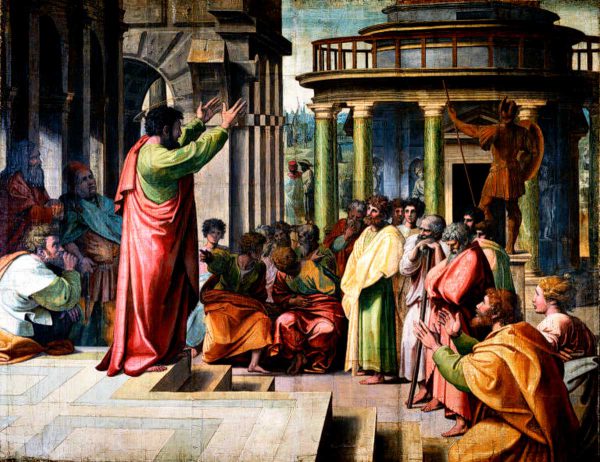
Paul Preaching in Athens (1515), by Raphael
One day, Paul was invited to speak to the learned people in Athens who enjoyed listening to new and challenging ideas. Paul challenges them with the idea that their faith in gods of stone and silver is futile.
He presents the First Commandment to them by quoting Greek philosophers and poets:
“’For in him we live and move and have our being.’ As some of your own poets have said, ‘We are his offspring.’
“Therefore since we are God’s offspring, we should not think that the divine being is like gold or silver or stone — an image made by human design and skill.” (Acts 17:28–29)
Of course, this idea of not worshiping idols is one of the foundational commandments that God gave to Moses, but it was new to the Greeks.
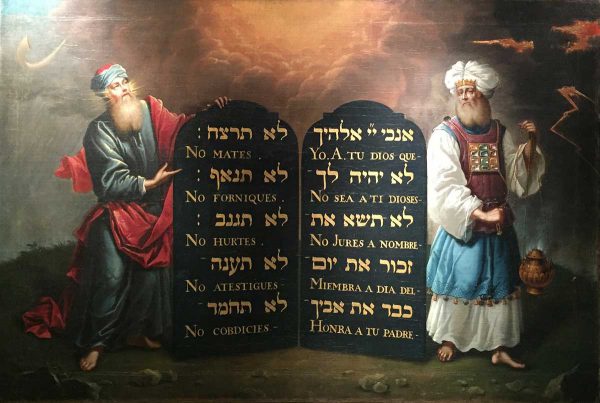
Moses and Aaron with the 10 Commandments (c. 1674), by Aron de Chaves
Although Paul was preaching to Gentiles, he still spoke like a solid Jewish Rabbi, when he told them:
“Now He [God of Israel] commands all people everywhere to repent.” (Acts 17:30)
If a Jewish person heard this message, the words would have evoked the warnings of the Hebrew prophets, such as Ezekiel who told the Israelites:
“Turn from your idols and renounce all your detestable practices!” (Ezekiel 14:6)
It is the same message that Yeshua and his cousin Yohanan (John) who was called the “Immerser” (Baptist) spread throughout Israel:
“Repent, for the kingdom of God has come near.” (Matthew 3:2, 4:17)
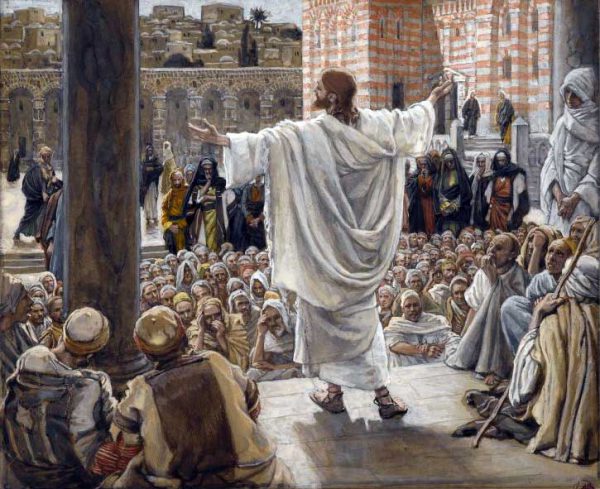
Yeshua often addressed the crowds, warning them to repent for the kingdom of God has drawn near (Illustration: Jerusalem, Jerusalem, by James Tissot)
Like Yeshua, Yohanan (John the Baptist), and the prophets of old, Sha’ul (Paul) warned the people that judgment is coming, urging them to make a choice between worshiping their stone idols and the One True Living God of Israel.
In the same way, the Jewish Prophet Elijah challenged the idol worshipers of Israel, “How long will you waver between two opinions? If the Lord is God, follow Him; but if Baal is God, follow him.” (1 Kings 18:21; see also Joshua 24:15)
Paul told them that this judgment would come “by the Man [Yeshua] He has appointed. He has given proof of this to all men by raising Him from the dead.” (Acts 17:31)
While some of the Greeks listening to Paul teach on the resurrection of the dead thought it was unbelievable, the Prophet Daniel clearly taught it (Daniel 12:1–2).
And Daniel taught us about the man that God has appointed coming with the clouds of heaven at the end of days.
Daniel saw in a vision “a son of man, coming with the clouds of heaven. … He was given authority, glory and sovereign power; all nations and peoples of every language served him. His dominion is an everlasting dominion that will not pass away, and his kingdom is one that will never be destroyed.” (Daniel 7:13–14)

As a Jewish Rabbi, Sha’ul (Paul) was so well-versed in Judaism and well-educated in reasoning the Hebrew Scriptures, that he could fascinate the Gentiles and his fellow Jews enough to keep their attention, win souls, and be asked to return to teach them more (Acts 13:42, 14:1, 18:19–20, 19:8).
That day in Athens, “some people joined him and believed.” (Acts 17:34)
And this is our goal with the Messianic Prophecy Bible that we are developing for both Jews and Gentiles.




